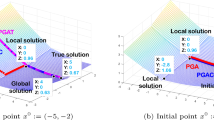Abstract
Interpolation-based trust-region methods are an important class of algorithms for Derivative-Free Optimization which rely on locally approximating an objective function by quadratic polynomial interpolation models, frequently built from less points than there are basis components. Often, in practical applications, the contribution of the problem variables to the objective function is such that many pairwise correlations between variables are negligible, implying, in the smooth case, a sparse structure in the Hessian matrix. To be able to exploit Hessian sparsity, existing optimization approaches require the knowledge of the sparsity structure. The goal of this paper is to develop and analyze a method where the sparse models are constructed automatically. The sparse recovery theory developed recently in the field of compressed sensing characterizes conditions under which a sparse vector can be accurately recovered from few random measurements. Such a recovery is achieved by minimizing the ℓ 1-norm of a vector subject to the measurements constraints. We suggest an approach for building sparse quadratic polynomial interpolation models by minimizing the ℓ 1-norm of the entries of the model Hessian subject to the interpolation conditions. We show that this procedure recovers accurate models when the function Hessian is sparse, using relatively few randomly selected sample points. Motivated by this result, we developed a practical interpolation-based trust-region method using deterministic sample sets and minimum ℓ 1-norm quadratic models. Our computational results show that the new approach exhibits a promising numerical performance both in the general case and in the sparse one.
Similar content being viewed by others
References
Alizadeh F., Goldfarb D.: Second-order cone programming. Math. Program. 95, 3–51 (2003)
Bandeira, A., Scheinberg, K., Vicente, L.N.: On partially sparse recovery. Tech. Rep. 11–13, Dept. Mathematics, Univ. Coimbra (2011)
Bandeira, A.S., Fickus, M., Mixon, D.G., Wong, P.: The road to deterministic matrices with the restricted isometry property. Submitted, available online: arXiv:1202.1234 [math.FA] (2012)
Baraniuk R., Davenport M., DeVore R., Wakin M.: A simple proof of the restricted isometry property for random matrices. Constr. Approx. 28, 253–263 (2008)
Candès E., Tao T.: Near optimal signal recovery from random projections: universal encoding strategies?. IEEE Trans. Inf. Theory 52, 5406–5425 (2006)
Candès, E.J.: The restricted isometry property and its implications for compressed sensing. Compte Rendus de l’Academie des Sciences, Paris, Serie I, pp. 589–592 (2009)
Colson B., Toint Ph. L.: Optimizing partially separable functions without derivatives. Optim. Methods Softw. 20, 493–508 (2005)
Conn A.R., Gould N.I.M., Toint Ph.L.: Trust-Region Methods. MPS-SIAM Series on Optimization. SIAM, Philadelphia (2000)
Conn, A.R., Scheinberg, K., Toint, Ph. L.: A derivative free optimization algorithm in practice. In: Proceedings of the 7th AIAA/USAF/NASA/ISSMO Symposium on Multidisciplinary Analysis and Optimization, St. Louis, Missouri, Sept 2–4 (1998)
Conn A.R., Scheinberg K., Vicente L.N.: Global convergence of general derivative-free trust-region algorithms to first and second order critical points. SIAM J. Optim. 20, 387–415 (2009)
Conn A.R., Scheinberg K., Vicente L.N.: Introduction to Derivative-Free Optimization. MPS-SIAM Series on Optimization. SIAM, Philadelphia (2009)
Dolan E.D., Moré J.J.: Benchmarking optimization software with performance profiles. Math. Program. 91, 201–213 (2002)
Dolan E.D., Moré J.J., Munson T.S.: Optimality measures for performance profiles. SIAM J. Optim. 16, 891–909 (2006)
Fasano G., Morales J.L., Nocedal J.: On the geometry phase in model-based algorithms for derivative-free optimization. Optim. Methods Softw. 24, 145–154 (2009)
Ferris, M.C., Deng, G.: Classification-based global search: An application to a simulation for breast cancer. In: Proceedings of 2008 NSF Engineering Research and Innovation Conference. Knoxville, Tennessee (2008)
Gould N.I.M., Orban D., Toint Ph.L.: CUTEr (and SifDec), a constrained and unconstrained testing environment, revisited. ACM Trans. Math. Softw. 29, 373–394 (2003)
Gratton S., Toint Ph.L., Tröltzsch A.: An active-set trust-region method for derivative-free nonlinear bound-constrained optimization. Optim. Methods Softw. 26, 873–894 (2011)
Jacques L.: A short note on compressed sensing with partially known signal support. Signal Process. 90, 3308–3312 (2010)
Moré J.J., Sorensen D.C.: Computing a trust region step. SIAM J. Sci. Comput. 4, 553–572 (1983)
Nocedal J., Wright S.J.: Numerical Optimization, 2nd edn. Springer, Berlin (2006)
Powell M.J.D.: On trust region methods for unconstrained minimization without derivatives. Math. Program. 97, 605–623 (2003)
Powell M.J.D.: Least Frobenius norm updating of quadratic models that satisfy interpolation conditions. Math. Program. 100, 183–215 (2004)
Powell, M.J.D.: The NEWUOA software for unconstrained optimization without derivatives. In: Nonconvex Optim. Appl., vol. 83, pp. 255–297. Springer, Berlin (2006)
Rauhut, H.: Compressive sensing and structured random matrices. In: Fornasier, M. (ed.) Theoretical Foundations and Numerical Methods for Sparse Recovery, Radon Series Comp. Appl. Math., pp. 1–92 (2010)
Rauhut H., Ward R.: Sparse Legendre expansions via ℓ 1-minimization. J. Approx. Theory 164, 517–533 (2012)
Scheinberg K., Toint P.L.: Self-correcting geometry in model-based algorithms for derivative-free unconstrained optimization. SIAM J. Optim. 20, 3512–3532 (2010)
Tao, T.: Open question: deterministic UUP matrices: http://terrytao.wordpress.com/2007/07/02/open-question-deterministic-uup-matrices (2007)
Vaswani N., Lu W.: Modified-CS: modifying compressive sensing for problems with partially known support. IEEE Trans. Signal Process. 58, 4595–4607 (2010)
Wild, S.M.: MNH: A derivative-free optimization algorithm using minimal norm Hessians. In: Tenth Copper Mountain Conference on Iterative Methods (2008)
Wojtaszczyk P.: Stability and instance optimality for gaussian measurements in compressed sensing. Found. Comput. Math. 10, 1–13 (2010)
Zhang Y.: Solving large-scale linear programs by interior-point methods under the MATLAB environment. Optim. Methods Softw. 10, 1–31 (1998)
Author information
Authors and Affiliations
Corresponding author
Additional information
The work of K. Scheinberg is partially supported by AFOSR under grant FA9550-11-1-0239 and NSF under grant DMS 10-16571. Support for L. N. Vicente was provided by FCT under grant PTDC/MAT/098214/2008.
Rights and permissions
About this article
Cite this article
Bandeira, A.S., Scheinberg, K. & Vicente, L.N. Computation of sparse low degree interpolating polynomials and their application to derivative-free optimization. Math. Program. 134, 223–257 (2012). https://doi.org/10.1007/s10107-012-0578-z
Received:
Accepted:
Published:
Issue Date:
DOI: https://doi.org/10.1007/s10107-012-0578-z
Keywords
- Derivative-free optimization
- Interpolation-based trust-region methods
- Random sampling
- Sparse recovery
- Compressed sensing
- ℓ 1-Minimization



